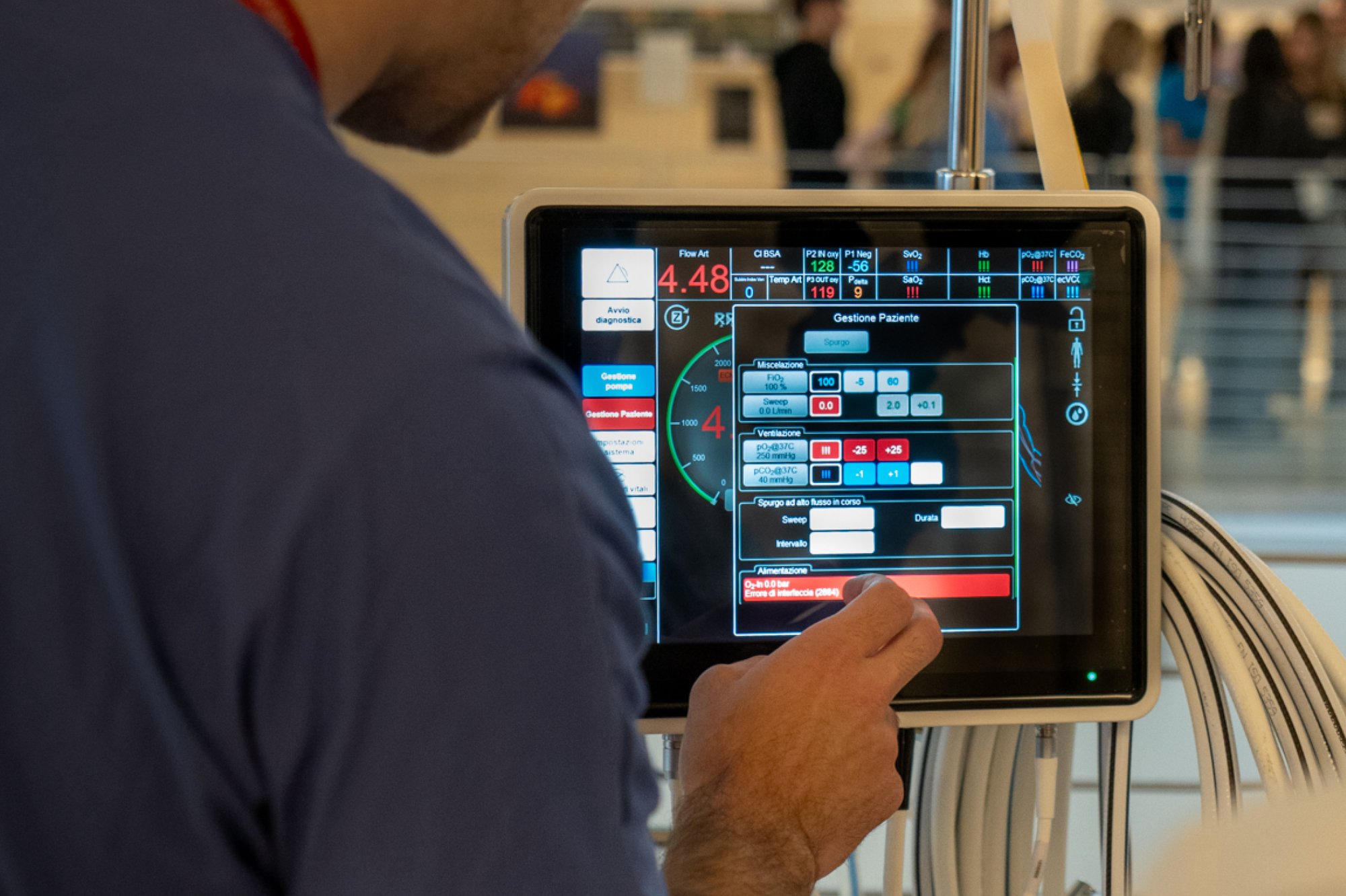Master's Degree in Health Informatics
The first course in Italy to train new professional figures specialized in information technologies serving medicine, biology, and scientific health research.
COURSE INFO
DURATION
2 years
LANGUAGE
English
AVAILABLE PLACES
12 for EU citizens
7 for NON-EU citizens residing abroad
ACCESS
Online home-based entrance test. Test date: 23/07/2025
ADMISSION DATE
From 30/06/2025 to 18/07/2025
JOINT TITLE WITH

Enrollments are closed

Are you interested in this degree course?
Enrollments are closed
Why Health Informatics at UniSR
Practical Experience on Innovative Technologies and Artificial Intelligence
High International Market Demand
Joint Degree with Politecnico di Milano
Overview
Health Informatics is a Master's Degree course born from the inter-university collaboration between Vita-Salute San Raffaele University and Politecnico di Milano, excelling in medical and technical-informatics training.
A two-year course in English that awards a joint degree, developing advanced IT and Machine Learning, Deep Learning, Artificial Neural Networks skills applied to medicine, forming highly sought-after professionals for today's and tomorrow's job market.
The realization of this revolution in medicine and biomedical research necessarily involves the training of new talents capable of integrating advanced computer scientist skills with a solid and broad knowledge of the specific healthcare context.
The goal? To solve complex problems in the medical and biological fields, as well as to improve diagnosis, intervention, and organization activities in various medical specializations.
"The current and near-future development of Artificial Intelligence (AI) will be the most important milestone for medicine since the invention of antibiotics."
Program
The academic path will enable you to:
-
explore, analyze, interpret data, and present results (data scientist);
-
efficiently design, implement, and distribute software (machine learning engineering);
-
understand clinical issues, design clinical studies, and manage research projects with IT as a fundamental driver
During the first semester of the first year, you can customize your study path by choosing between two alternative courses:
-
Software systems design and operations
-
or "Biology, Genetics, Anatomy and Physiology".
The choice will depend on your previous educational experience and will allow you to effectively tackle the continuation of the course of study.
In the common path, you will encounter advanced teachings in statistics, data classification and processing, epidemiology, etiological mechanisms, diagnosis and treatment of diseases, analysis and design of clinical studies. Alongside the development of Machine Learning, Deep Learning, Artificial Neural Networks algorithms with particular attention to clinical solutions, human-machine interfaces, and the knowledge, analysis, and processing of biomedical images. You will also learn the definition and extraction of omic biomarkers, and explore the opportunities offered in terms of data, analysis, and creation of dynamic databases through the use of wearable devices.
🤔 Does the course include a practical component?
Of course! The labs and the UniSR Artificial Intelligence-HUB: the program includes numerous exercises, practical activities, and labs up to the thesis project, which can also be realized through significant research and development projects at UniSR and POLIMI labs and research centers.
This Master's Degree offers a highly relevant "training ground" for education and practice: the “AI-HUB” Artificial Intelligence Center of UniSR/OSR. Within the HUB, you can gain hands-on experience with big data from the real clinical world.
This is made possible by an interoperable digital platform developed by UniSR in collaboration with Microsoft, significantly enhancing the use of big data for the efficient, fast, responsible, safe, and accurate development of Machine and Deep Learning algorithms, and Artificial Neural Networks.
Skills and Career Prospects
During the course, you will gain skills in the following areas:
Information Technology (IT)
Statistical/Data Science
Basic biological/clinical knowledge
Moreover, the course will enable the development of appropriate transversal skills in communication and relational aspects, as well as organizational and managerial capabilities.
🤔 Which career paths may I pursue after graduation?
After obtaining a Master's degree in Health Informatics, you can pursue various professional roles such as Health Informatics Consultant, Project Manager, Data Analyst, IT Analyst, Information Security Officer, Chief Artificial Intelligence Officer, Chief Health Information Officer, Electronic Medical Record Keeper, Chief Information Officer, and Informatics Manager.
There are numerous contexts in which you can find job opportunities:
- Hospitals, research institutions, or public and private healthcare companies, in the fields of clinical or translational research, administrative, operational, and healthcare management;
- Universities, companies, and industries, in multidisciplinary teams engaged in the development of IT and AI tools for the healthcare sector;
- Entrepreneurial sectors where the implementation, management, and analysis of healthcare big data or omic data are fundamental for the development and production of innovative IT tools for the benefit of care and societal well-being;
- Public entities or health insurance and pension companies;
- Consulting firms;
- Healthcare IT companies.
Moreover, graduates in Health Informatics can continue their academic journey, even abroad, by pursuing PhD programs and second-level university master's degrees.
🤔 How is the market evolving?
“The global AI in healthcare market size was estimated at $15.1 billion in 2022 and is expected to exceed $190 billion by 2030, growing at a 37% annual rate during the forecast period 2022-2030, outpacing the general AI growth.”
Precedence Research, february 2023
The European Commission predicts that advanced computer sciences will significantly improve citizens' lives, bringing benefits to society and the economy through better healthcare. Healthcare is the sector where digital development and AI techniques could have the greatest impact in addressing societal challenges.
The EIT Digital Report emphasizes that AI in the healthcare sector faces challenges in terms of organization and skills, making it necessary to:
- Support the development of skills or retraining of healthcare professionals through tailored educational programs;
- Promote specific healthcare training for data scientists working in hospitals so they can better understand the needs of healthcare professionals.
Are you interested in this degree course?
Fill out the form with your email: we will send you the information you need to know for the entrance test. No spam, we promise!

Admission Requirements and Test
Admission to the Health Informatics course is based on a selection through an entrance test and academic career evaluation. The test is mandatory for all candidates who wish to access the course and is organized once a year. Other exams or scores cannot replace the UniSR admission test.
🤔 Who can register for the admission test?
Registration for the admission test is available to both EU and non-EU candidates who have already graduated or that are going to graduate within the Autumn session of the AY 2024/2025.
🤔 What educational requirements do I need to meet to enroll in the course?
To participate in the selection procedures, you must have obtained:
1. Bachelor's degree in one of the following classes: L2 - Biotechnology; L8 - Information Engineering; L13 - Biological Sciences; L31 - Computer Science and Technologies; LM41 - Medicine and Surgery
Or:
2. At least a three-year degree, or obtained through the acquisition of 180 CFU, with the following constraints:
-
- 21 CFU acquired in INF/01, ING-INF/05 sectors
Or
-
- 21 CFU acquired in BIO/09, BIO/13, BIO/16 sectors
- 21 CFU acquired in BIO/09, BIO/13, BIO/16 sectors
The same criteria apply to those who hold a university degree obtained abroad, deemed suitable by the evaluating committee.
If the SSDs (Scientific Disciplinary Sectors) cannot be identified, the CCdS (Course Coordination Committee) will evaluate the academic career based on the verification of the exam syllabi.
3. English Language Certification: A minimum of B2 level according to the Common European Framework of Reference for Languages (CEFR).
In the absence of the above conditions, the Commission will take into consideration the list of exams taken with the related course programmes that the candidate must include in their application to evaluate their admissibility.
🤔 How does the entrance test work?
The admission test is held online and consists of 24 multiple choice questions in English, divided as follows: 8 in Mathematics, 8 in Informatics, 2 in Biology, 2 in Genetics, 2 in Anatomy, and 2 in Physiology. The total duration is 60 minutes.
Available places:
- 12 for EU citizens
- 7 for NON-EU citizens residing abroad
Registration period: from June 30, 2025, at 12:00 PM to July 18, 2025, at 12:00 PM (Italian time)
Test date: July 23, 2025 (online)
Registration fee: 150€
The admission process consists of two parts: the requirement to take the admission test and an evaluation of personal merit acquired during the previous academic carreer. This evaluation considers whether the candidate has adequate preparation to address the specific disciplines of the Master's program.
🤔 How much does the Health Informatics course cost?
The annual tuition fees are €6.640.
For further details, please refer to the dedicated page on the website.
How to register for the entrance test
Fill out the form with your email
We will send you the information you need to know for the entrance test.
No spam, we promise!🤞
For your future, choose the best.
Vita-Salute San Raffaele University is a reference point for excellent university education, being one of the most highly rated universities in our country.
1st
THE World University Ranking 2025
26th
1st
Censis, Università non statali ed. 2024-25
